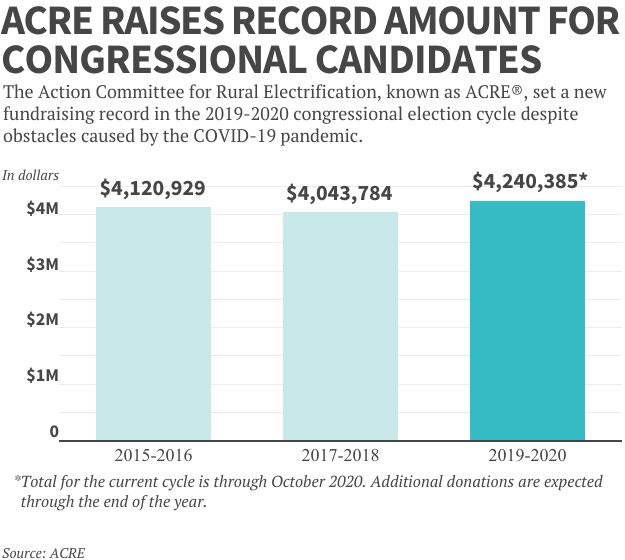NRECA’s political action committee overwhelmingly supported winners of the 2020 congressional elections, with 96% of House candidates and 86% of Senate candidates backed by the PAC emerging victorious so far.The
Action Committee for Rural Electrification, better known as ACRE®, also set a new fundraising record in the 2020 election cycle despite the COVID-19 pandemic forcing the cancellation of in-person events. With two months of ACRE receipts remaining to report, the committee has raised $4,240,385 to date in 2019-2020, said ACRE Director Gabe Snow. That compares with $4,120,929 in the 2015-2016 cycle and $4,043,784 in 2017-2018.
“It’s nice to be able to report that, cycle-over-cycle, we continue to grow as we continue to see enthusiasm among the eligible membership to participate in the program,” Snow said.
Despite ACRE’s record-setting success this cycle, the amount of contributions slowed in 2020 compared to last year because of the pandemic.

The percentage of ACRE-backed candidates who won this year’s races could change slightly as results continue to be tabulated. There are still three House candidates supported by ACRE whose contests have not been called. Two Senate races in Georgia will be decided by special runoff elections in January. So far, however, the percentage of ACRE-backed candidates who won is higher than it was in 2018— 94% of House candidates and 81% of Senate candidates.
ACRE supported 329 House candidates: 165 Republicans and 164 Democrats. Of those, 319 have won so far and seven have lost.
In the Senate, 25 of the 29 candidates supported by ACRE have won their races so far and two have lost. ACRE supported 22 Republican Senate candidates and seven Democrats. Republicans had nearly twice as many senators up for re-election this year as Democrats.
ACRE supports candidates who support issues important to electric cooperatives, which tends to result in ACRE largely supporting incumbents. The PAC does not donate to presidential candidates.
NRECA CEO Jim Matheson said NRECA and its members will continue to work in a bipartisan way with the new Congress, which takes office in January. He pointed out that co-ops have been successful even in a divided government. NRECA and its members won passage last year of two major priorities—the
RURAL Act and the
SECURE Act—with support from a Democratic-led House and a Republican-led Senate.
“We have been able to overcome divided government with our bipartisan approach, and we need to keep that up going forward,” Matheson said.
Because of the pandemic, Snow and ACRE Deputy Director Amy Lewis had to cancel about two dozen trips they would normally have taken this year to help co-ops and statewide associations with fundraising and grassroots efforts. While in-person events remain essential to ACRE’s future efforts, Snow and Lewis said they believe virtual candidate forums are here to stay.
“Our ability to engage with candidates running for Congress really saw a shift as they got more comfortable doing virtual events,” Snow said. “We were able to include folks back in the congressional districts, including our co-op members, eligible employees or board members, without having to fly them to D.C. or having someone from NRECA travel to the district. If we can continue to provide those opportunities in a post-pandemic environment, I think that would be beneficial. It doesn’t replace the in-person events, but it will augment them.”
ACRE receives voluntary grassroots contributions—which average about $65 a year—from more than 35,000 eligible co-op employees, directors and consumer-members in 47 states, Snow said. In general, hourly employees are not eligible to contribute because of federal laws designed to prevent workers from feeling coerced by their bosses to give. However, those employees are allowed to contribute if they are co-op consumer-members, Snow said.
Erin Kelly is a staff writer at NRECA.
Contributions to the NRECA Action Committee for Rural Electrification® (ACRE®) are not tax deductible for federal income tax purposes. Contributions to ACRE are voluntary and will be used for political purposes. You have the right to refuse to contribute without reprisal. Federal law prohibits contributions from foreign nationals who lack permanent resident status. Any contribution guidelines presented are merely suggestions. You are free to contribute more or less than the suggested amounts, or not at all. NRECA will not favor or disadvantage anyone by reason of the amount contributed or a decision not to contribute.
*Federal law requires us to use our best efforts to collect and report the name, mailing address, occupation and name of employer of individuals whose contributions exceed $200.
